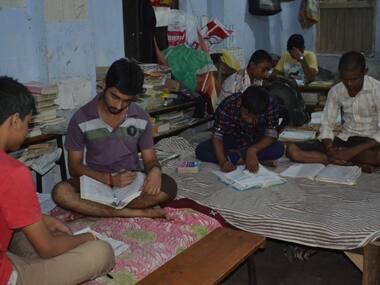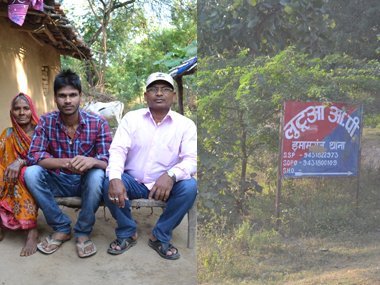Gaya: Soni Reshmi was born and brought up under the shadow of guns, explosive devices and violence. For the young like her in Dumaria, a Maoist-affected locality 83 km west of Gaya, education is not one of the priorities of life, survival is. But the 17-year-old has fought the odds with rare determination. She is preparing to become a software engineer from Indian Institute of Technology (IIT).[caption id=“attachment_2483382” align=“alignleft” width=“380”]  Ashwini Gunjan with his father Bindeshwari Prasad Mandal and grandmotherDevpati Devi at his ancestral house at Lutua village in Gaya.Tarique Anwar/Firstpost[/caption] Similar is the case of Ashwini Kumar Gunjan of Lutua village, a Red bastion under Imamganj police station. He never thought he would crack the All India Engineering Entrance Examination (AIEEE) to study metallurgy at National Institute of Technology (NIT) at Jamshedpur in Jharkhand. His village that shares border with Jharkhand’s Aurangabad and Chatra districts has earned a bad name for Sandeep Yadav, a top Maoist Communist Centre (MCC) commander wanted in four states – Bihar, Jharkhand, Odisha and Chhattisgarh. The village, thickly covered with forest and surrounded by mountains, is completely cut-off from the rest of the district and deprived of all basic facilities. It has no road because no contractor dares to place bids to take contract for construction of roads here. The area, where encounters between Maoists (commonly known as party men) and Central Reserve Police (CRPF) commandos are a regular occurring, has only one primary school and a primary health centre. Both are in extremely pathetic condition. The residents here are trapped between Maoists and CRPF men. The Red warriors knock their doors at night and put an unreasonable demand of food for their 100-200 comrades and when they leave, the CRPF men raid their houses and harass them. The difficult situation, however, has proved no barrier to talent. The results of an unofficial survey recently carried out by a group of IIT Kharagpur students reveal that the IQ level of children studying in government schools here is either equal or higher than their counterparts in big cities.[caption id=“attachment_2483374” align=“alignleft” width=“380”]  Students busy studying at the Magadh Super-30 institute. Tarique Anwar/Firstpost[/caption] “Becoming a software engineer is my childhood dream. Because of lack of educational awareness in my village, I did not know how to go about it. But after cracking Magadh Super-30 entrance test, I found a way. Under the guidance of my teachers here, I am sure I will achieve my target of getting into the IIT next year; it does not matter how difficult it is,” says a confident Soni Reshmi, whose house was blown off by Maoists a year ago. The institute was established in 2008 and has so far sent 20 students of the area to IITs, 35 to NITs, six to Maritime University, Chennai, and at least 100 to other government engineering colleges across the country. Ashwini Gunjan’s father Bindeshwari Prasad Mandal had to leave his ancestral place at Lutua to protect his son from Left Wing Extremism and pursue higher education. “Faced with regular Maoist and police harassment and lack of educational opportunities, I along with my wife and children had to leave the village. I took the decision despite my financial condition just to protect my children from joining the ranks of Maoists and becoming a target of police bullets. I got strength when my son cleared the entrance test for Jawahar Navodaya Vidyalaya. “After he passed standard 10 from Navodaya, he appeared in an examination conducted by FIITJEE and got a scholarship for preparation of IIT-JEE. Since I was unable to bear the residuary cost, I could not get him admitted there. He then appeared for Magadh Super-30 entrance test and got selected. And finally, the result is before you. My son will be the first engineer from my village,” said the proud father, a small farmer and a vitt rahit (non-salaried) government teacher. Interestingly, both Gunjan and Reshmi have a word of wisdom for political parties. “Merely asking Maoists to leave the path of violence is not going to make any difference and solve the problems. Bring development in Maoists-hit areas, connect the villages to the outer world and create employment opportunities in such areas. Establish more schools because only education can solve our problems,” Gujan said. A brief interaction with other students of the institute gives you an idea of their resolve. Shivam Raj, son of a small farmer who is pursuing mechanical engineering from IIT Kanpur, wants to become an IPS officer; Amit Kumar, son of a daily wage labourer is pursuing B Tech from NIT Jaipur and Shashi Kant, son of a private school teacher is studying mining at ISM Dhanbad, wants to become an entrepreneur and professor respectively. The institute has an annual budget of Rs 10-12 lakh which is arranged through public donation. “We go among people of the district and urge them to donate for us whatever they can. We do a social audit every August. On this occasion, we invite our donors and present them the details of expenditure of funds they had given us along with the results of that year,” said Pankaj Kumar, a journalist who serves the institute as secretary voluntarily. The institute has four permanent teachers and the rest are visiting faculties. “All of them serve the institute without any payment. We try to pay the fuel cost of our teachers who come from Patna. They accept with a lot of insistence,” said Kumar. Interestingly, the police officers with science or IIT background who get posting in the district also take classes of the students.
The difficult situation, however, has proved no barrier to talent.
Advertisement
End of Article


)
)
)
)
)
)
)
)
)



